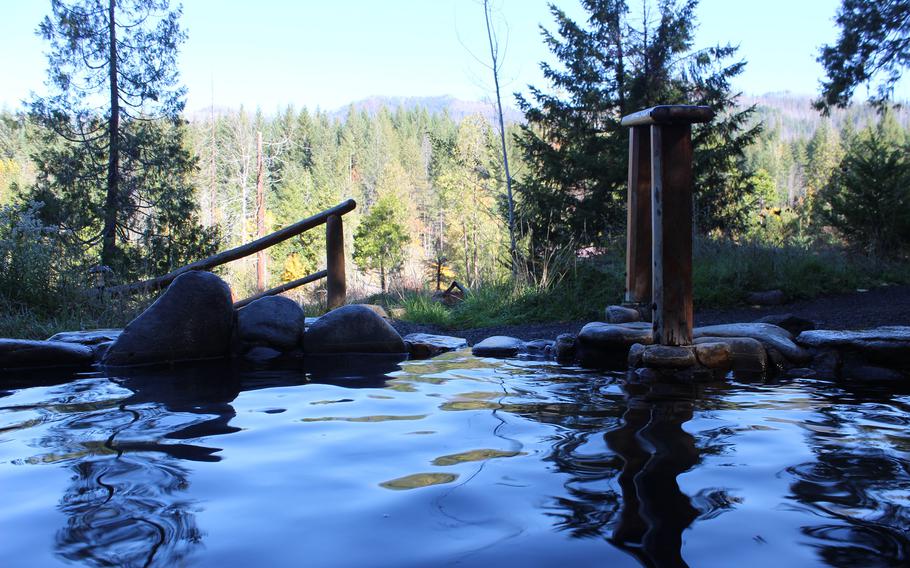
The soaking pools at Breitenbush Hot Springs range from 100-110 degrees and are filled exclusively with geothermal mineral water from on the property. Humans have soaked in these waters for thousands of years, as the pools were well-known to Indigenous people in central Oregon. (Gregory Scruggs, The Seattle Times/TNS)
DETROIT, Ore. — Has life been a sprint since Labor Day? The post-summer rush is exhilarating but also exhausting. One cure: a getaway for a mid-autumn reset. For a thorough recharge, spend 48 hours in a digital and physical detox.
That’s what I did recently at Breitenbush Hot Springs Retreat and Conference Center in central Oregon on a regimen of no internet, cell service, meat, alcohol or caffeine. The off-grid wooded property along the Breitenbush River is dotted with rustic accommodations, a cozy lodge and a constellation of 100-110 degree, clothing-optional geothermal pools perfect for soaking during an autumn chill.
But my visit was a small miracle. In September 2020, a devastating wildfire engulfed Breitenbush and nearly wiped it off the map. Valiant firefighters drawn from the Breitenbush ranks saved the community from total annihilation in one of the worst fires in Oregon’s history. The setting looks a little different today between the diminished forest cover, burn scars and new construction replacing buildings lost to the blaze.
Between fire and floods, this place is no stranger to natural disaster. Three years on, Breitenbush is well on the path to recovery, rebuilding and downright thriving with the potential to emerge better than ever.
Getting there and getting settled
Breitenbush is nestled in a canyon at 2,200 feet on the western slopes of the Oregon Cascades, about 260 miles from Seattle. You need a vehicle to reach Breitenbush — there is no reliable shuttle or taxi service — and the nearest car rental options are in Salem or Portland, both of which are served via Amtrak Cascades.
When traveling south on I-5, you have two options. The West Cascades Scenic Byway runs 63 miles from Estacada, southeast of Portland, on a paved mountain road through river canyons and with majestic views of volcanic Mount Jefferson. Or take Route 22 east from Salem for 59 miles through Detroit. From Nov. 1 to Apr. 1, the Oregon Department of Transportation requires vehicles to carry snow chains on the plowed road to Breitenbush.
Both routes are pockmarked with scars from the multiple wildfires that converged on Central Oregon in September 2020. The fires destroyed all but one building in Detroit, which is slowly rebuilding. The burned hillsides are more extensive than any I’ve seen along a Washington paved road, although pockets of untouched trees illustrate the temperate rainforest that recently stood here.
Be advised that Breitenbush is not a luxury spa resort. Since 1977 Breitenbush has operated in its current configuration: a worker-owned cooperative whose Carter-era environmental and communitarian ideals persist. The setting is eminently comfortable, but demands some self-sufficiency.
For example, upon arrival you park at the entrance, check in at the office and wheel your belongings in a pushcart along gravel and dirt trails for five to 10 minutes to your lodging. Breitenbush is not Americans with Disabilities Act-accessible, but there are often ramps or slopes to navigate the property in lieu of stairs. Exterior lighting is minimal to allow for stargazing, so packing a flashlight or headlamp is essential.
In October, my family of three stayed one night in the heated Sundial Yurt ($252 per night), which backs up to the natural white noise machine of the Breitenbush River. I slept soundly, although hooks for hanging clothes and wet towels would have made the Spartan yurt more comfortable.
The next night we tried the Marsh Wren, an unheated canvas wall tent amid a bird-themed cluster called The Aviary ($182 per night). All unheated lodging closed for the season on Nov. 1, though there is talk of installing pellet stoves in future years. I wore fleece and sweatpants under blankets and slept comfortably on an autumn night that bottomed out around 50 degrees, but if you run cold, pack thermal base layers.
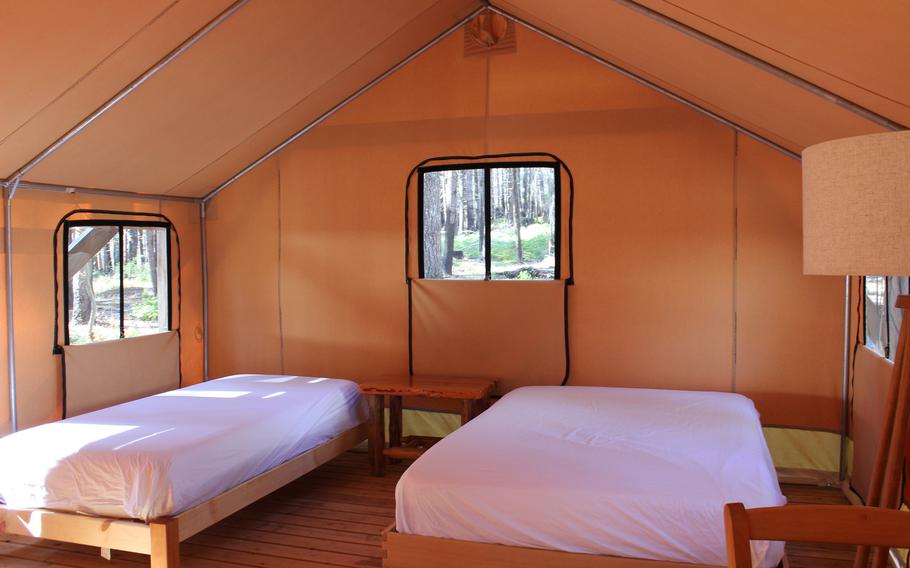
Canvas walled tents are part of the new lodging offerings at Breitenbush Hot Springs in central Oregon. These unheated options are closed for the season from Nov. 1 to Apr. 1, but may be equipped with pellet stoves in the future for use during the winter. (Gregory Scruggs, The Seattle Times/TNS)
The Grove, which sits in a clearing that burned in 2020, consists of brand-new heated cabins, four units per structure ($157-$237 per night). For a budget option, Breitenbush offers small rooms with bunk beds in Milky Way, a converted milk truck ($117 per night). Lodging comes with a mattress and top sheet. Bring your own warm bedding, pillow and towel, or rent a set ($30 for singles, $35 for couples for the duration of your stay). Definitely pack a robe and sandals for the pools.
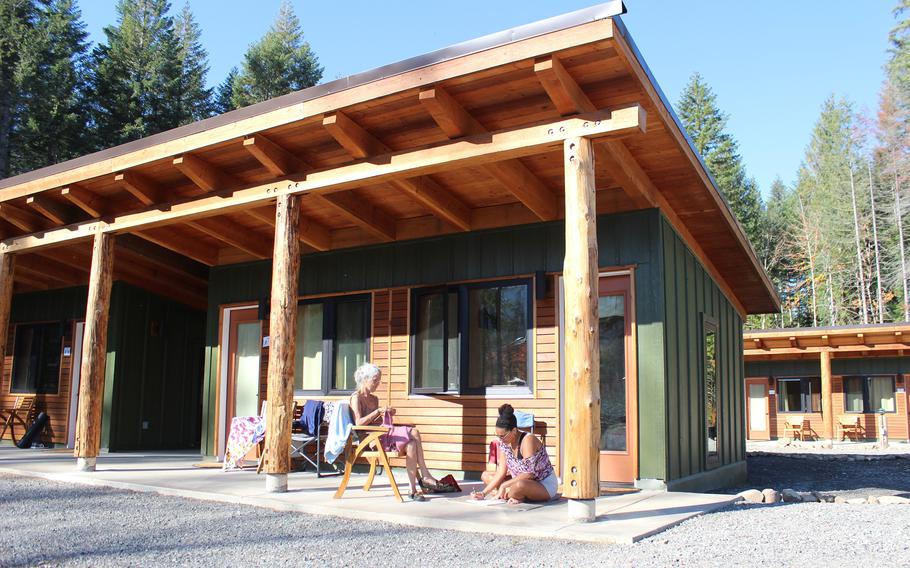
Eugene resident Doris Reynolds crochets and Portland resident Aketi Merrick draws in front of their cabin in the Grove, one of the new lodging options built at Breitenbush Hot Springs in the wake of destructive September 2020 fires. The mother and daughter have been planning this visit for over three years, but had to reschedule due to the pandemic, wildfires and reconstruction. (Gregory Scruggs, The Seattle Times/TNS)
Lodging has electricity for basics like lamps and charging, but cannot handle appliances like hair dryers. There is no in-room running water. Instead, portable bathrooms and sinks are stationed throughout the property, plus two bathhouses with hot showers.
Meal ticket
Walking the whole property takes 15-20 minutes, and strolling under the forest canopy — much of which still remains, even if burn marks are visible — is part of the meditative Breitenbush experience. And stroll you must, because unless you’re staying in one of two rooms inside the centrally located lodge ($142 per night), you’ll need to walk for meal time.
All prices include room and board, with Breitenbush serving three cafeteria-style meals a day at set times. You’ll hear the meal bell anywhere on the property. Don’t dally — food is only out for one hour.
The menu is completely vegetarian, mostly organic and often vegan and gluten-free. Breakfasts of oatmeal, yogurt, granola, eggs and fruit were standard satisfying fare. Lunches and dinners were hit or miss. I adored an autumn arugula salad with squash and slathered vegan dill butter on homemade bread, but picked at a taco bowl of walnut chorizo and vegan nacho cheese.
My highlight was the daily drink, from a refreshing blueberry ginger mint limeade to cardamom and hawthorn berry tea. I leaned on the hot drink my first morning after I resolved to abide by the Breitenbush credo and forswear my daily cuppa. Caffeine isn’t served, but it is tolerated. I navigated past a gantlet of bathrobe-clad guests making French press coffee, resolved that nine hours of sleep and not looking at my phone before bed had left me properly rested.
Don’t like the food? You can bring snacks or grab something from the gift shop, and there is a communal fridge in the lodge, but there are no cooking facilities for guests. There is always soup and a salad bar if the main course is unappealing, though many find the meals among Breitenbush’s top attractions.
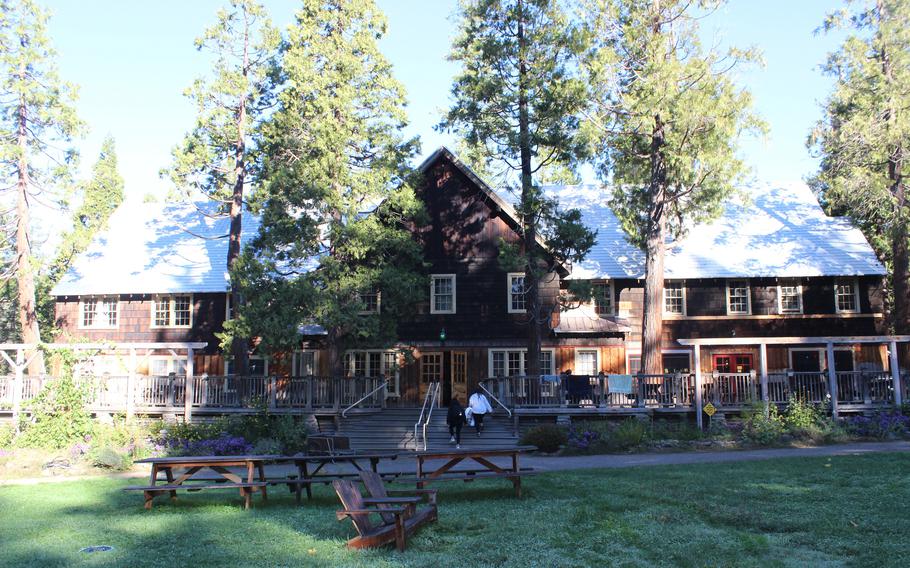
The historic lodge at Breitenbush Hot Springs serves three daily meals, all vegetarian, and provides a gathering space for guests. (Gregory Scruggs, The Seattle Times/TNS)
The historical lodge is Breitenbush’s nerve center with a library, gift shop and massage rooms. Everyone gathers at mealtime — in nice weather, the ample deck seating is a delight, although when rain forces everyone indoors, the dining hall gets cramped. Many linger in the lobby to read, chat, work on a jigsaw puzzle or play the 100-year-old piano. On a Saturday night when the resort was close to fully booked, a dozen guests sparked an impromptu singalong for after-dinner entertainment.
The main event of the day, of course, is soaking. There are two hot springs zones to choose from. A steam sauna and three meadow pools are just off the lodge, with views across the canyon. The hottest, the silent pool, is the ultimate retreat. Just your thoughts and the sound of the forest.
Behind the lodge and down a slope lie four tubs laid out in a spiral that increase in temperature as you move around the cardinal directions, plus a cold plunge tub for the classic heat-up-cool-down spa cycle. Individual bathtubs are also available on a first-come, first-served basis where you can set your preferred temperature.
All tubs are clothing-optional, coed and all ages. On my visit the split between nude and clothed was roughly 50-50. Pools are open 24 hours and a nighttime soak under the stars comes highly recommended.
Off-grid resilience
When you’re not immersed in the mineral waters, take a nap on the grass, calm your mind walking the labyrinth or sit by the rushing Breitenbush River. Water powers the hydroelectric dam, flushes the fish passage, provides drinking water via an on-site filtration system and gushes out of the earth from an 800-foot artesian well to heat Breitenbush’s structures and fill its pools. The only outside energy sources are propane for cooking and fuel for a small number of vehicles.
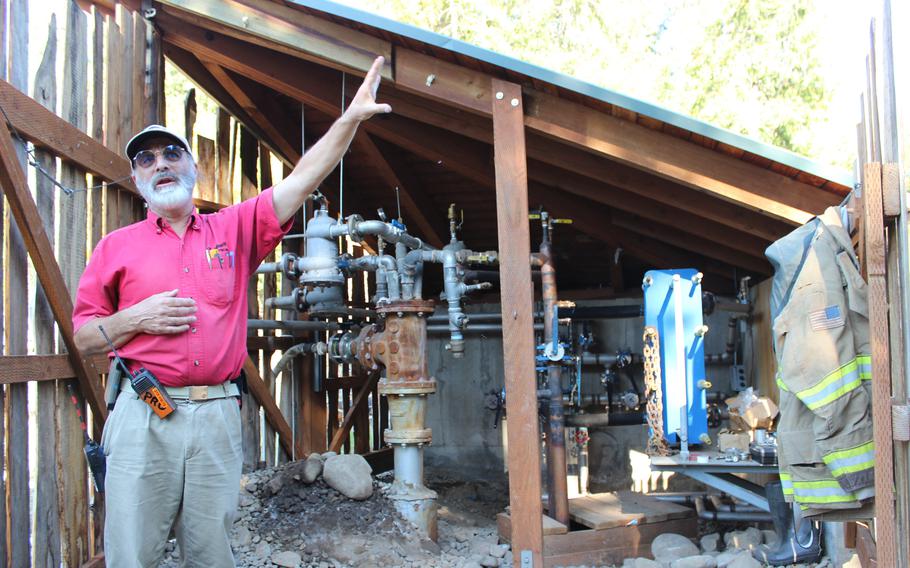
Paul Hewett leads a tour of the off-grid systems at Breitenbush Hot Springs every Saturday afternoon. Here he shows off the 800-foot artesian well, drilled by Breitenbush worker-owners themselves, which provides heat for all structures on the property. (Gregory Scruggs, The Seattle Times/TNS)
Maintaining this self-built infrastructure, cooking for hundreds daily, cleaning pools and serving guest needs falls to 53 staff and a handful of the cooperative’s member-owners. Such communal experiments were once common throughout the Pacific Northwest, but few have persisted with Breitenbush’s plucky determination.
The 2020 fire was devastating, though hardly the place’s first brush with disaster. Floods in the 1960s wiped out the business under its first owners, who established a health spa in the 1920s. When Alex Beamer bought the land in 1977 to start an intentional community, the derelict resort was uninhabitable. It took years to forge the bespoke wellness setting beloved of yoga practitioners and spiritual retreat leaders. The recent fire took 70 structures, many historical, in a matter of days.
An insurance payout, a forgiven Paycheck Protection Program loan and donations tallied $6 million to start the rebuilding process, which business director Peter Moore estimates will take 10 years to complete. (Full disclosure: My wife donated to the recovery campaign.) But such timelines don’t phase Moore, who was part of the pioneer era of idealistic dreamers who built the place from scratch. He is adamant that resilience in the face of adversity is inherent to Breitenbush’s DNA.
“This is not just a destination resort or a hotel restaurant service in the woods,” he said. “There is something palpable about our commitment to be in nature, be self-reliant and respect natural processes and wilderness as much as we respect security, safety and comfort.”
When the initial shock from the 2020 fires wore off, Moore’s attitude was constructive.
“Let’s get to work, let’s survive and then we’ll thrive again,” he said.
That spirit rubs off on guests. After my weekend of relaxation, I felt reinvigorated to tackle the rest of the season ahead.
If you go
Breitenbush Hot Springs Retreat and Conference Center
53000 Breitenbush Rd. S.E., Detroit, Oregon; 503-854-3320; breitenbush.com; lodging, meals, parking and soaking privileges $117-$237 per night. Day-use passes are $35 for adults 17+ and $20 for ages 5-17 and provide access to all facilities from 9 a.m. to 6 p.m. Lunch is not included but can be purchased.